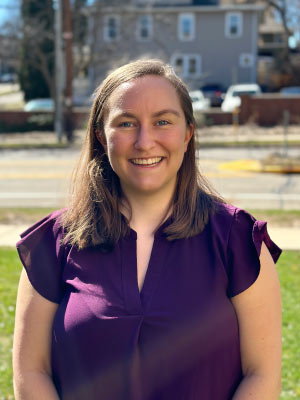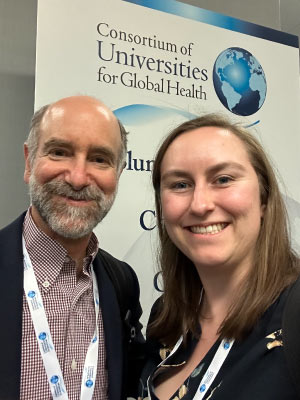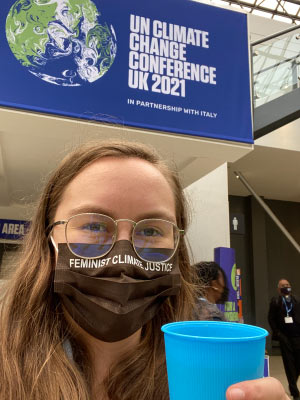
Nova Tebbe, a PhD student in the Center for Sustainability and the Global Environment, exemplifies the interdisciplinary research of the Nelson Institute. She describes her research as the intersection of climate change, health, equity, and policy. Tebbe discovered her passion for policy in an undergraduate philosophy class as she delved deep into political issues to understand their history and implications. This led her to complete a dual degree — a master’s of public health and a master’s of public administration — at UW–Madison; however, Tebbe didn’t feel that her education was finished.
“I felt if I didn’t go for a PhD, then a lot of that work and a lot of the questions I’d been asking would remain unanswered, and I don’t think my brain could handle that,” Tebbe said. It helped that Tebbe worked with her current PhD advisor, Professor Jonathan Patz, during her master of public health coursework, and he encouraged her to pursue a PhD.
One of Tebbe’s recent research projects was a policy analysis submitted on behalf of the Paris Agreement. In 2015, this landmark climate agreement was signed at the United Nations Climate Change Conference. The agreement aims to hold climate warming well under 2°C above preindustrial levels, and to achieve this, individual countries establish their own greenhouse gas reduction goals called Nationally Determined Contributions.
The policy analysis submitted was for the Global Stocktake (GST). In short, the many submissions making up the GST evaluate the Paris Agreement. “The purpose is to take stock of how well countries were doing on those targets in the Paris Agreement every five years,” Tebbe explained. The GST takes two years to complete and began in 2021 instead of 2020 due to COVID-19.
The GST is extremely important because it allows observer organizations to provide input on successes and shortcomings of implementing the Paris Agreement. Across the globe, diverse environmental organizations and advocacy groups can apply for observer status with the United Nations to provide this feedback. “This is the first global stocktake, so we’re not entirely sure of the implications yet, but the opportunity is essential,” Tebbe said.
Additionally, the GST has an eye on the future. According to Tebbe, “The stocktake helps inform future [United Nations Climate Change conferences] as well, like what should be talked about, and what should be drafted in some of those initial texts.”

Tebbe led a team in conjunction with the Global Climate and Health Alliance (GHCA) to create a submission for the GST. Jess Beagley was instrumental from the GHCA side, and Tebbe also wanted to highlight the integral assistance of UW–Madison undergrad, Madison Xiong. Jonathan Patz’s group has a longstanding relationship with the GHCA, and with observer status, the GHCA can submit to the GST.
The submission itself focused on climate mitigation policies that also benefit health and equity. The health and equity benefits stemming from climate mitigation policies are commonly called co-benefits – a key area of research for the Patz group.
Tebbe said, “What makes our policy briefs unique is that we showcase [climate mitigation] policies that have health and equity co-benefits. We gave a submission to show there are policies that are positive for health, positive for equity, that have been happening on local levels of these countries, and we need to amplify that.”
The report focused on 15 climate mitigation policies spread across eight sectors, like energy and transportation. To choose the policies, the team completed a multi-goal policy analysis using specific criteria. Tebbe made these detailed criteria by extensively reviewing primary literature to measure the health and equity outcomes of policies. For the GST submission, there were five health goals and six equity goals used to assess policies. For example, one health goal is “to reduce premature mortality,” and one equity goal is “to improve community ownership.”
However, even with the criteria, narrowing down the policies was a formidable challenge. “When you think about mitigation policies, let’s say for the energy sector, there are tons of different policy options,” Tebbe said.
Despite the challenges, Tebbe feels proud and confident of their submission — in fact anyone can see their hard work. Tebbe encourages people to check out the submission because it’s public.
The report outlines that ambitious climate policies are: 1) needed; 2) provide health and equity co-benefits if done right; and 3) already being done on local levels.

Enabling fast and equitable fossil fuel phaseouts for electricity generation is a policy outlined in the submission. Phaseout plans for coal, natural gas, and oil need to account for equity concerns, such as providing reliable and affordable electricity, and engaging local communities. “We want to make sure that communities who are at the forefront and live near fossil fuel facilities are the first ones who are part of that phase-out because they’re experiencing the burden of those health risks,” Tebbe said. Burning coal, for instance, presents a serious health hazard as particulate matter enters deep into people’s lungs and can cause respiratory illnesses.
Now that the report has been submitted to the United Nations, Tebbe is preparing the research for a scientific publication so it’s seen by more people. “At the end of the day, we want to make an impact and make the connections between climate change, health, and equity really well known. That’s our overarching goal here,” Tebbe said.
Furthermore, Tebbe wants to make her criteria to analyze policies for equity and health benefits broadly available. “We want to get an expert opinion on those criteria and publish that as well so that the criteria can be used by advocates, by anybody who wants to advocate for or analyze climate mitigation policies in health and equity,” Tebbe said.
Simply contributing to the GST was a special experience for Tebbe. “I would say as a PhD student, doing something at the United Nations level, is to me still unbelievable, and knowing that my work, that the research I’m doing is directly applied and organizations like the Global Climate Health Alliance value that work, to me is like a dream come true,” Tebbe said.
In the coming months, the United Nations will release a summary report of the submissions for the first GST. “Hopefully, our submission, in terms of health and equity, makes its way in [the summary report], but there are hundreds and hundreds of submissions,” Tebbe said.
Regardless of what appears in the official summary report, Tebbe and her team clearly showed the health and equity co-benefits of climate policies.
This story was originally published by the Energy, Analysis, and Policy program.